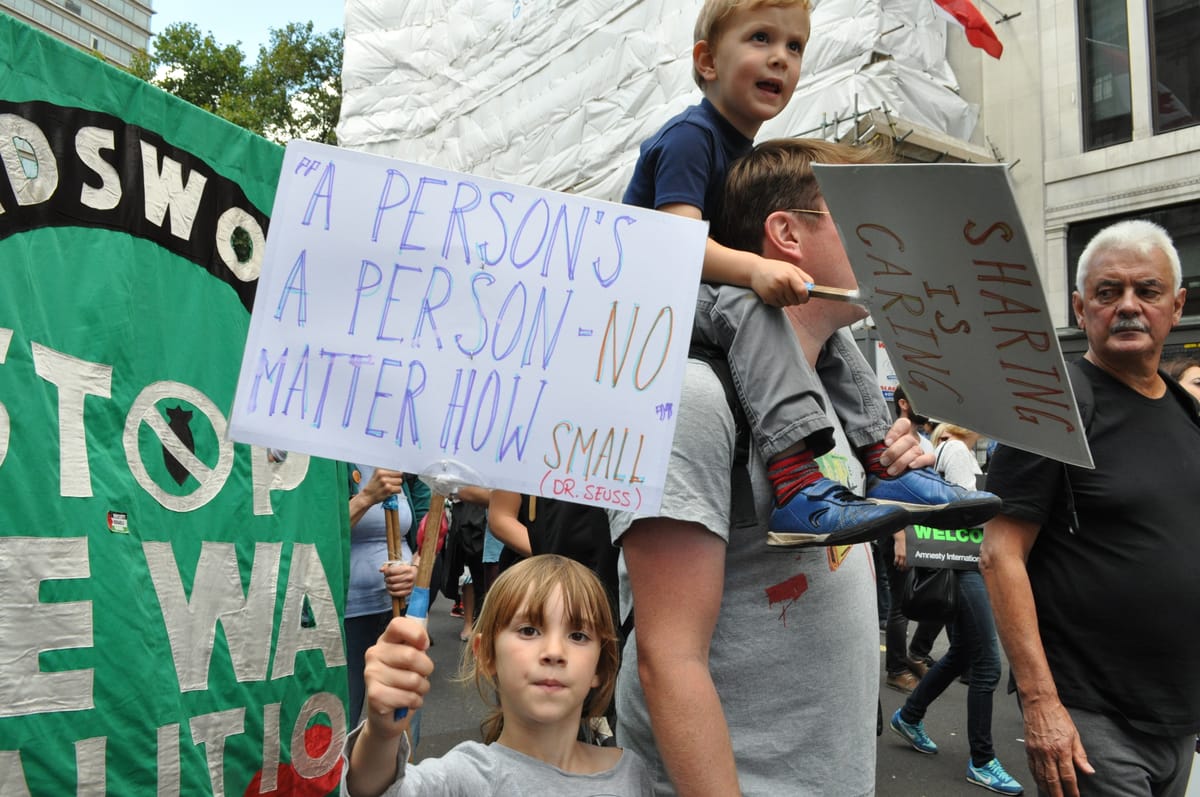Refugees Welcome at SOAS? ‘Empty Words’, Says SU Co-President


Mel Plant, BA Arabic and Turkish
During recent talks between the Students’ Union and the university concerning plans for Freshers’ Week, SOAS officials proposed the display of a banner on the main building proclaiming ‘Refugees Welcome’, as a head-nod to the solidarity movement for refugees and asylum seekers which has gained popularity in recent weeks. After the publication all over the world of the photographs of Alan Kurdi washed up on a beach in southern Turkey, the movement, already bolstered over the past few months with members of the British public beginning to arrange aid convoys to Calais, exploded into the headlines. Kurdi, a 3-year old child from Kobane, drowned in the Mediterranean with his mother and brother, as the dinghy that was supposed to carry him and his family to European shores capsized. What had been a small movement on the fringes of European society, powered by leftists, anarchists, No Borders activists and resettled refugees, has now moved into the public eye.
Refugees are everywhere: all over the headlines and social media newsfeeds. They’re being invited into homes in Iceland, Sweden, and Germany, with activists using social media to create free versions of AirBnB for refugees. Reportedly 90,000 people marched through Westminster on the 12th of September, protesting the government to resettle far more than the 20,000 promised by David Cameron. The atmosphere at the march was optimistic: comedic banners and signs reigned, and solidarity was the word of the day. Yet the most the government has done is to promise that 20,000 Syrian refugees will be settled in the UK by 2020 – that is, roughly 4,000 a year – with those who are taken in as minors being deported when they reach the age of 18. Popular opinion is as diverse as the strong and badly mixed cocktail of opinions that was present in the House of Commons during a recent emergency debate on the state of the refugee crisis.
But are refugees welcome at SOAS? University officials seem to think so with their proposal to display a banner echoing this sentiment. Though many members of the student body may feel that SOAS is a welcoming environment for refugees, the Student’ Union co-president for Democracy and Education Hannah Slydel has challenged the schools proposal, saying it is ‘difficult to see this as little other than empty words and an opportunity for good PR’. More specifically, Slydel sees the school’s suggestion of a ‘Refugees Welcome’ banner as hypocritical as, she says, the school has done nothing to demonstrate or practically implement this sentiment in the past.
SOAS offers little in the way of scholarships to refugees, apart from the Cultures of Resistance scholarship that is targeted to students from conflict areas seeking to study a Masters degree at SOAS. Until recently, refugees studying at SOAS were charged international student fees, with little financial support available. In the context of universities becoming increasingly privatised, ‘border regimes offer SOAS a profit making opportunity’, which they exploit by assigning ‘million-pound contracts’ to outsourcing companies like MITIE and ISS. SOAS was involved in the facilitation of the deportation of several cleaners working at the university in 2009, employed by the sub-contractor ISS, now infamous at SOAS for its questionable attitude towards workers’ rights. Alongside its continued failure to meet the demands of SOAS cleaners, ISS also operates in illegal Israeli settlements in the West Bank, providing cleaning and pest control services. Until 2014, the company with which SOAS provides an average £1,494,752 annual contract also provided security services in West Bank settlements.
Alongside this implicit support of commercial exploitation of illegal Israeli settlements, SOAS also contracts MITIE for ‘property and building services maintenance’, though this contract, like ISS’ is due to be reviewed in December of this year. MITIE is notorious for being a market-leader in the provision of immigration detention services within the UK. Over the last financial year, MITIE profited over £2,000,000 from its management of immigration detention centres, most notably Harmondsworth. The treatment of detainees in centres run by MITIE frequently makes the national news, with suicides, hunger strikes and reports of abuse not being out of the usual. Many asylum seekers and refugees are locked up in MITIE-run detention centres for indefinite periods, and the fact that SOAS provides the company with an average annual contract of £729,618 strikes a somewhat different note to the suggestion of SOAS officials to display a ‘Refugees Welcome’ banner. To top this off, SOAS’ new director Valerie Amos voted in favour of detaining children under-18 in immigration detention centres and against the employment of asylum seekers in the UK during her time in the House of Lords.
Involvement with companies like MITIE and ISS, and what is perceived as a generally unwelcoming attitude towards refugees and migrant workers by the university, has led Slydel to comment that the school’s proposal for refugee-friendly Freshers’ Week decorations is out of touch, and ‘little other than empty words and an opportunity for good PR’. Slydel commented that the current refugee crisis is not an ‘isolated or exceptional event’, rather that it is direct manifestation ‘imperialism, oppression and borders in all their manifestations’. Going on to specify that a ‘welcoming and safe environment for migrants will not just be created through kind words, but through action,’ Slydel said that she would welcome any genuine actions by the SOAS establishment to create such an environment for refugees and demonstrate the sentiment behind the proposed banner.



